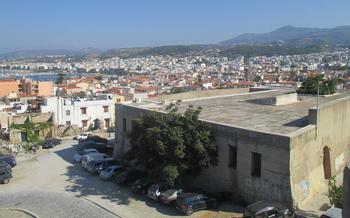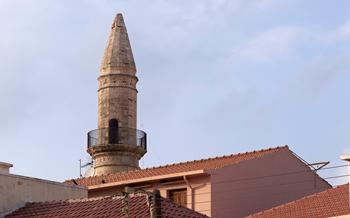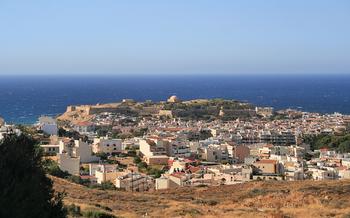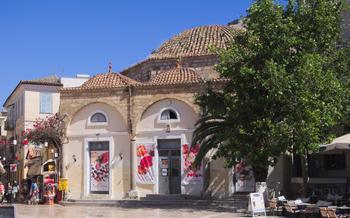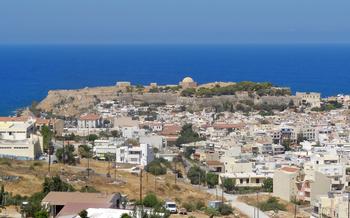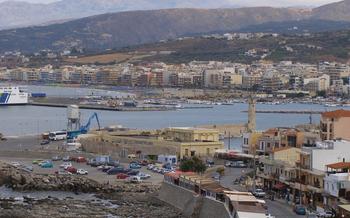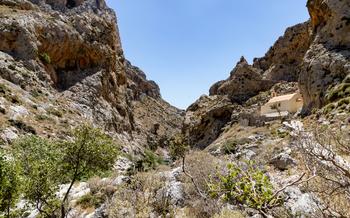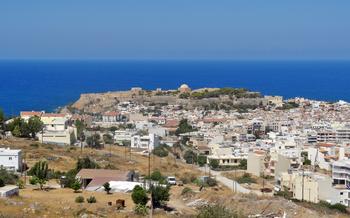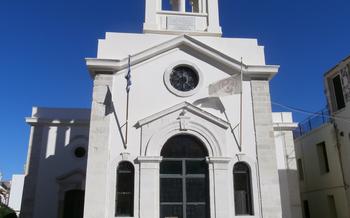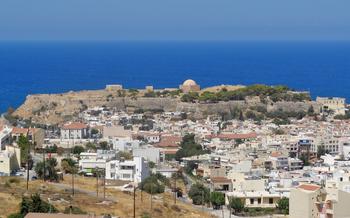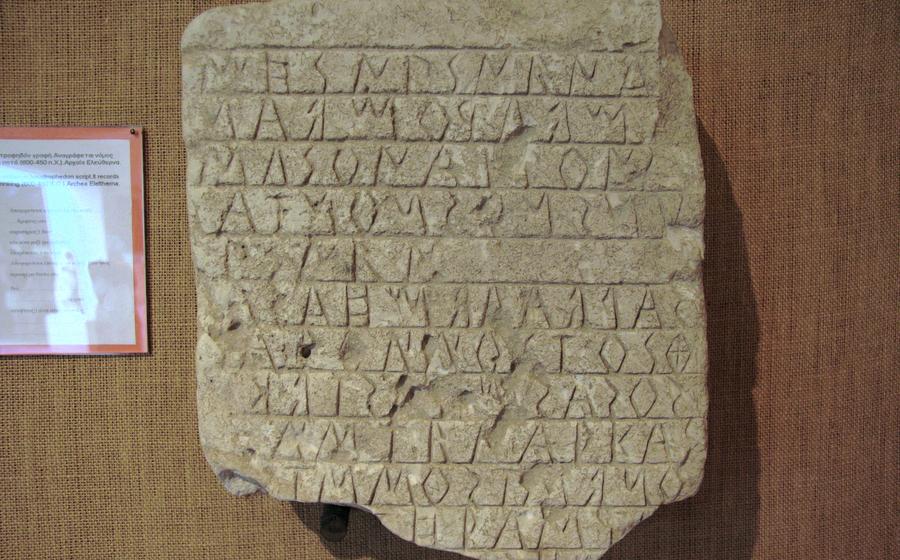
Ancient Eleutherna
- Historical Significance
- Archaeological Discoveries
- Unique Features
- Mythology and Legends
- Panoramic Views
- Hiking Trails
- Olive Oil Production
- Local Cuisine
- Wine Tasting
- Festivals and Events
- Sustainable Tourism
- Accessibility
- Photography Opportunities
- Insider Tip:
Historical Significance
Eleutherna, an ancient city-state in Crete, holds a significant place in Greek history. Founded in the 9th century BC, it strategically stood at the crossroads of important trade routes, connecting the north and south of the island. As a major city-state, Eleutherna flourished as a center of commerce, culture, and religion. Its strategic location allowed for effective control of the surrounding fertile plains and access to valuable resources.
Eleutherna's prominence extended beyond Crete, as it played a crucial role in the Greco-Persian Wars. During the 5th century BC, the city joined forces with other Greek city-states to repel the Persian invasion. Eleutherna's contribution to the war effort earned it recognition and respect throughout the Greek world. However, the city's fortunes declined in the following centuries, gradually fading into obscurity. Despite its eventual decline, Eleutherna's legacy endures as an important chapter in Crete's rich history.
Archaeological Discoveries
Eleutherna has yielded a wealth of archaeological treasures that provide valuable insights into the city's history and daily life. Among the most significant discoveries are the well-preserved city walls, which date back to the 4th century BC and feature impressive cyclopean construction techniques. These walls, along with towers and gates, formed a formidable defensive system that protected the city from invaders.
Excavations have also revealed numerous public buildings, including a bouleuterion (council chamber), a theater, and a gymnasium. These structures attest to the city's political, cultural, and educational significance. The theater, in particular, is a remarkable example of ancient Greek architecture, with well-preserved seating rows and an orchestra.
Additionally, archaeologists have unearthed a variety of artifacts that shed light on Eleutherna's economy and culture. These include pottery, coins, and inscriptions, which provide information about trade, religion, and daily life in the ancient city. The discovery of imported goods, such as pottery from Athens and Corinth, indicates Eleutherna's extensive trading network and its connections to the wider Greek world.
Unique Features
Eleutherna stands out for its distinctive architectural features that reflect the city's advanced engineering and urban planning skills. The cyclopean walls, built using massive blocks of stone, showcase the city's defensive capabilities. The stepped streets, designed to facilitate movement and drainage, add a unique character to the site. The impressive water management system, consisting of aqueducts, cisterns, and fountains, demonstrates the city's commitment to providing clean water to its inhabitants.
Other unique aspects of Eleutherna include the presence of a theater, where plays and performances were held, and a sanctuary dedicated to the goddess Britomartis, an important deity in Minoan and Greek mythology. The necropolis, with its elaborate tombs and funerary offerings, provides insight into the burial practices and beliefs of the ancient Eleuthernians.
These unique features, combined with the ongoing archaeological excavations and research, make Eleutherna a fascinating destination for those interested in ancient history, archaeology, and the rich cultural heritage of Crete.
Mythology and Legends
Eleutherna is steeped in mythology and legends that have been passed down through generations. According to Greek mythology, the city was founded by Eleuthernos, the son of the god Zeus and the nymph Dione. Eleuthernos was said to have been raised by the Curetes, mythical beings who were believed to have protected the infant Zeus.
The city played a significant role in Greek mythology, particularly in relation to the Minoan civilization and the Trojan War. It was believed to have been one of the cities that participated in the Trojan War on the side of the Greeks. Eleutherna was also associated with the goddess Britomartis, who was worshipped in the city and had a sanctuary dedicated to her.
Other deities and heroes associated with Eleutherna include Artemis, the goddess of hunting and wilderness, and Apollo, the god of music, poetry, and prophecy. These deities were worshipped in the city and had their own temples or shrines. The rich mythology and legends surrounding Eleutherna add to its allure and make it a fascinating destination for visitors interested in ancient Greek culture and history.
Panoramic Views
The site of Eleutherna offers breathtaking panoramic views that will captivate any visitor. Perched atop a hill, the ancient city commands a majestic vista overlooking the surrounding countryside and the distant mountains. The sweeping views encompass olive groves, vineyards, and rugged landscapes, creating a tapestry of colors and textures. From this vantage point, visitors can appreciate the strategic location of Eleutherna, which allowed its inhabitants to keep watch over the surrounding area and defend against potential threats. The panoramic vistas from Eleutherna provide a unique perspective on the ancient city and its relationship with the natural environment. Whether capturing stunning photographs or simply soaking in the beauty of the landscape, visitors will be mesmerized by the breathtaking views that Eleutherna has to offer.
Hiking Trails
For those who enjoy exploring the natural beauty of Crete on foot, Eleutherna offers a range of hiking trails that start from or pass near the archaeological site. These trails provide an opportunity to immerse oneself in the scenic landscapes of the region, combining history with adventure.
The trails vary in difficulty and length, catering to hikers of different fitness levels and interests. Some trails are relatively easy, suitable for families with young children, while others offer more challenging routes for experienced hikers. The trails wind through olive groves, vineyards, and gorges, showcasing the diverse flora and fauna of the area.
Along the way, hikers can admire the stunning views of the surrounding countryside, with the distant mountains forming a picturesque backdrop. The trails also offer the chance to discover hidden gems, such as secluded beaches, traditional villages, and Byzantine churches, providing a glimpse into the rich cultural heritage of Crete.
For those interested in learning more about the natural and cultural history of the region, guided hiking tours are available. These tours are led by experienced guides who can provide insights into the local flora, fauna, and history, making the hiking experience even more enriching.
Olive Oil Production
The region of Rethymno, where Eleutherna is situated, has a long and rich tradition of olive oil production. Olive trees have been cultivated in Crete for millennia, and the island's unique climate and soil conditions contribute to the production of high-quality extra virgin olive oil. Olive oil is an essential ingredient in Cretan cuisine, adding flavor and depth to many traditional dishes. It is also an important part of the local economy, with many families relying on olive oil production for their livelihood.
Visitors to Eleutherna can learn about the process of olive oil production and sample the locally produced extra virgin olive oil. Several olive groves and oil mills in the area offer guided tours and tastings, allowing visitors to see firsthand how olives are harvested, pressed, and transformed into the golden liquid gold. Visitors can also purchase olive oil and other local products directly from the producers, supporting the local economy and taking home a taste of Crete to enjoy.
Local Cuisine
The island of Crete is renowned for its delicious and healthy cuisine, which has been influenced by various cultures throughout history, including Greek, Venetian, and Ottoman. The region of Rethymno, where Eleutherna is located, is particularly known for its fresh ingredients, flavorful dishes, and emphasis on healthy eating.
Some of the signature dishes of the region that visitors should try include dakos, a traditional Cretan salad made with barley rusks, tomatoes, cucumbers, onions, and feta cheese; gamopilafo, a creamy rice dish cooked with chicken or lamb and served on special occasions; and kalitsounia, sweet or savory pastries filled with cheese, spinach, or meat.
For those who want to learn more about Cretan cuisine, cooking classes and culinary tours are available, offering visitors the opportunity to learn how to prepare traditional dishes and experience the local food culture firsthand. These classes and tours are often led by local chefs or food experts who share their knowledge and passion for Cretan gastronomy.
Visitors can find a variety of tavernas and restaurants in Rethymno and the surrounding area that serve authentic Cretan cuisine. Many of these establishments use fresh, locally sourced ingredients and take pride in preserving traditional recipes. Whether you're looking for a quick bite or a leisurely dining experience, there are plenty of options to satisfy your taste buds and provide a truly Cretan culinary adventure.
Wine Tasting
The Rethymno region is renowned for its viticulture tradition, and visitors to Eleutherna have the opportunity to delve into the world of Cretan wines. The island's unique climate and terroir have fostered the cultivation of indigenous grape varieties, resulting in distinctive and flavorful wines. Visitors can embark on a journey of discovery, visiting local wineries nestled amidst picturesque landscapes. These wineries offer guided tours, wine tastings, and the chance to learn about the winemaking process from passionate local producers. From crisp whites to robust reds, Cretan wines showcase the essence of the region and pair perfectly with traditional Cretan cuisine. Whether you're a wine enthusiast or simply curious to sample the local flavors, a wine tasting experience in Rethymno is a must-do for any visitor seeking an authentic taste of Crete.
Festivals and Events
Rethymno is known for its vibrant cultural scene, and visitors to Eleutherna have the opportunity to experience traditional Cretan festivals and events throughout the year. The Eleutherna Festival, held annually in July or August, is a highlight of the cultural calendar. This festival showcases the rich history and traditions of the region through a variety of events, including concerts, theatrical performances, art exhibitions, and traditional dancing.
Other festivals and events in the Rethymno region include the Rethymno Carnival, a colorful celebration with parades, music, and dancing that takes place before Lent, and the Cretan Wine Festival, held in July, which offers visitors the chance to sample local wines and experience the island's viticulture tradition.
By checking the local event calendar and planning their trip accordingly, visitors can immerse themselves in the cultural heritage of Rethymno and create lasting memories of their time in this captivating region.
Sustainable Tourism
Eleutherna and its surroundings offer a unique opportunity for sustainable tourism, allowing visitors to explore the region's rich history and natural beauty while respecting the environment and supporting the local community. Local authorities and tourism businesses have implemented various initiatives to promote responsible tourism practices, including waste management, water conservation, and the use of renewable energy sources. Visitors are encouraged to adopt sustainable practices during their visit, such as respecting the environment, supporting local businesses, and minimizing their carbon footprint. By choosing to travel responsibly, visitors can contribute to the preservation of Eleutherna's heritage and ensure that future generations can also enjoy this remarkable destination.
Accessibility
Eleutherna is committed to providing an accessible and inclusive experience for all visitors, regardless of their abilities. Wheelchair-accessible paths and ramps have been constructed throughout the archaeological site, ensuring that visitors with limited mobility can easily navigate the ruins. The on-site museum is also fully accessible, with ramps, elevators, and accessible restrooms. For visitors with visual impairments, audio guides and tactile maps are available to enhance their understanding of the site. Additionally, trained personnel are on hand to assist visitors with special needs and provide guided tours that cater to their specific requirements. With these accessibility features in place, Eleutherna welcomes all visitors to immerse themselves in the history and beauty of this ancient city.
Photography Opportunities
Eleutherna and its surroundings offer exceptional photography opportunities for enthusiasts of all levels. The ancient ruins, set against the backdrop of the rugged Cretan landscape, create a picturesque scene that is sure to captivate any photographer's lens. The play of light and shadow on the weathered stones, especially during sunrise and sunset, adds a dramatic touch to your shots.
Whether you're a professional photographer seeking unique compositions or a hobbyist capturing memories of your trip, Eleutherna has something to offer. Remember to bring your camera or smartphone and be prepared to capture the essence of this ancient city and its natural surroundings.
Insider Tip:
For an unforgettable experience, plan your visit to Eleutherna during the annual Eleutherna Festival, usually held in the summer months. This vibrant cultural event brings the ancient city to life with traditional music, dance performances, theater productions, and historical reenactments. Immerse yourself in the spirit of ancient Greece as you witness costumed actors portraying mythological figures and engaging in interactive storytelling. The festival offers a unique opportunity to learn about Eleutherna's rich history and heritage while enjoying a lively and entertaining atmosphere. Check the local event calendar for specific dates and program details.
